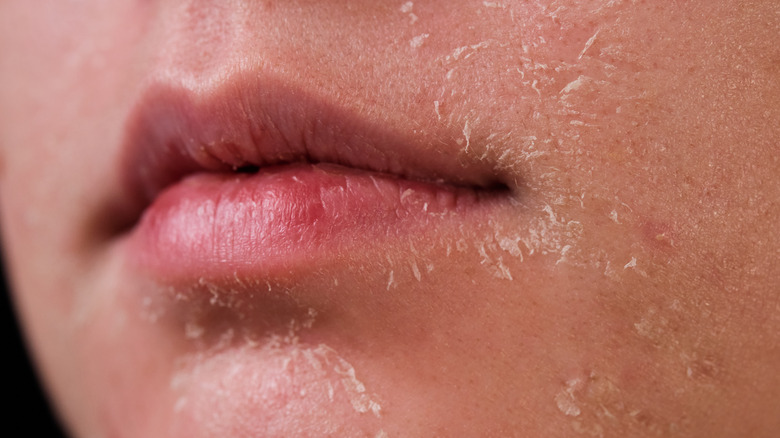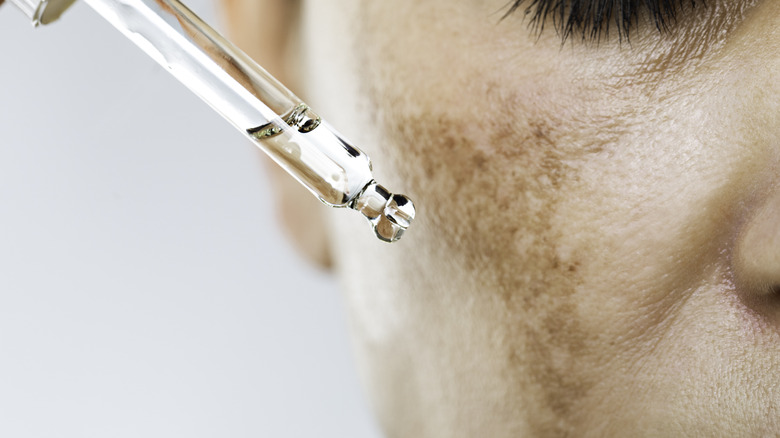What Happens To Your Skin When You Don't Eat Enough Protein
Everyone knows that proteins are essential to the body, but why is this the case? According to Medline Plus, proteins are the building blocks of your cells, and they are responsible for creating antibodies, enzymes, and messenger cells, to name just a few. Harvard Health Publishing states that you should eat just under half your body weight in grams of protein per day, or 0.36 grams per pound.
Getting all that protein can be challenging, especially when you follow a strict diet or have a condition that makes meeting your daily protein requirements more complicated. For example, finding complete plant proteins can be more challenging for those on a vegan diet.
However, not eating enough protein can affect your body by increasing swelling, diminishing muscle mass, and weakening bones, per Healthline. It can also cause your hair, nails, and skin to suffer. For example, you might find your skin is dry and flaky, shows more wrinkles, or has discoloration.
Lack of protein makes your skin flaky
Your body has different protein-related needs. When it comes to your skin, elastin, collagen, and keratin come into play. Dr. Jeffrey Hsu, M.D., FAAD, founder of Oak Dermatology, explains to She Finds, "The two most important proteins are collagen and elastin. Collagen is the most abundant protein; it makes up more than 75 percent of our skin and provides structural integrity for the skin. Elastin gives the skin its elasticity, allowing the skin to stretch and bounce back after movement." These proteins also keep your skin looking supple and hydrated.
When you don't have enough protein, your skin can feel tight, itchy, and scaly. The Mayo Clinic states that you might also find it starting to peel and crack in places. This can be easily seen in children suffering from severe protein malnutrition known as kwashiorkor, which presents with dry, thin skin that cracks and peels, per StatPearls. The condition isn't often seen in developed countries, but it can be devastating for those countries where poverty and malnutrition are prevalent.
Most cases of protein deficiency won't get this bad in the U.S., but ensuring you and your children get the proper amount of protein is vital. You can also apply moisturizer, take short showers, and use gentle soaps to help rehydrate your protein-deficient skin, according to the American Academy of Dermatology Association.
Protein deficiency can lead to wrinkles
Your body will naturally lose collagen with age, leaving you with wrinkles and fine lines, according to the Cleveland Clinic. They are most noticeable in the delicate areas of your eyes (crow's feet) and around your mouth.
Additionally, 2019 research in the Indian Dermatology Online Journal showed that getting sufficient protein plays a role in both maintaining collagen and the aging process. It found that eating less than the recommended amount of protein or not eating protein for breakfast had "loose and fragmented collagen." Additionally, 2020 research in Nutrients found that the skin renewal repair cycle was affected by a protein deficiency, and not getting enough dietary protein could play a role in premature skin aging. Michael Hirt, M.D., an internal medicine doctor, told MBG Lifestyle, "Since the body's exterior is largely made of protein, the first signs of protein deficiency are often on the surface."
Sure, you can use products to help increase the collagen in your skin, but your first line of defense should be adding protein to every meal. For example, vegans might add a bit of edamame to their meals for some extra protein. An egg white omelet is also a great way for those watching their cholesterol to get more protein with their breakfast.
Hyperpigmentation can occur from a protein deficiency
Areas of the skin that have more pigment than the skin around them — a phenomenon called hyperpigmentation — can appear black, gray, or red, per the Cleveland Clinic. When this happens in older people, it might be referred to as liver spots or sunspots, but these concentrated areas of melanin can occur on any skin area at any age.
Melanin is the medical term for pigment found in the deepest layer of your skin that decides the color of everything on your body, from deep brown to light peach (via WebMD). It plays many vital roles, like protecting you from the sun's harmful UV rays and removing reactive oxygen species (molecules in the body linked to stress, disease susceptibility, and the aging process). Hyperpigmentation can have several underlying causes, but one that stands out when it comes to those lacking in the protein department is sun damage (per the National Institutes of Health).
The good thing about damage caused by a deficiency in protein is that it might be reversible, per 2022 research in Cureus. You can also find other treatments to help speed up the process, like corticosteroids, hydroquinone, and niacinamide, according to the Cleveland Clinic.




